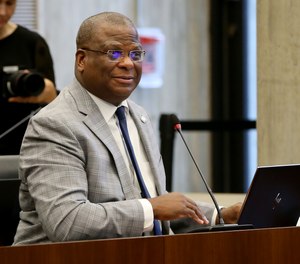
“At the end of the day, BRIC helps solve crimes, particularly violent crime, homicides. BRIC brings justice and some solace, a little bit of peace and a little bit of closure,” city councilor Michael Flaherty said
By Gayla Cawley
Boston Herald
BOSTON — The City Council voted to approve $3.4 million in grant funding for the Boston Regional Intelligence Center, after a lengthy discussion that determined the need for public safety outweighs past harms created by the entity’s gang database.
The body’s 7-5 vote on Wednesday releases four years worth of funding to the intelligence arm of the city’s police department, money that has been earmarked by the state since fiscal year 2020, but had been held up by the City Council.
“At the end of the day, BRIC helps solve crimes, particularly violent crime, homicides,” City Councilor Michael Flaherty said. “BRIC brings justice and some solace, a little bit of peace and a little bit of closure to those that have had a loved one killed in the streets of Boston.”
The funding will go toward improving technology aimed at fighting crime, gangs and terrorism. It will allow the intelligence center to hire eight additional analysts, four of whom will “monitor active events and communicate in real time,” Mayor Michelle Wu, who filed the grants, wrote in a letter to the City Council.
“The BRIC provides invaluable intelligence gathering and data to keep our city safe and prevent crime,” City Council President Ed Flynn said.
“We want intelligent police,” Councilor Frank Baker added. “We don’t want the opposite of an intelligent police force.”
In a Wednesday statement, the mayor praised the Council for voting to advance the grant funding, saying that the BRIC plays a “critical role” in providing the intel and analysis to “close gaps through deploying coordinated resources and service.”
With the leadership, culture and oversight in place today, I am confident in the Boston Police Department’s capacity and commitment to keep our communities safe, and will continue to ensure that Boston is implementing necessary changes to build community trust and collaboration,” Wu said.
Most of the opposition centered around the BRIC’s gang database, which critics say is racially discriminatory in that it disproportionately tracks people of color.
The five councilors who voted against the grants were unconvinced that reforms, through new leadership at the police department and efforts to purge inactive names from the database, have done enough to repair prior harms.
“I don’t believe it makes us safer,” Councilor Ricardo Arroyo said. “They haven’t proven their worth and the fact that they’re currently under investigation for possible civil rights abuses and racial discrimination makes it impossible for me to vote for these grants today.”
Councilor Kendra Lara said a vote in favor of funding the BRIC was “regressive,” and one that points to a city “moving backwards on police reform.”
“We should not only be moving funding away from BRIC, we should be looking at how to get rid of the gang database altogether,” Lara said. “I am a little discouraged that it is evident this vote is going to fall along racial lines.”
Councilors Gabriela Coletta and Liz Breadon voted in favor while calling for more accountability, transparency and oversight of the entity. Coletta called for the body to hold bi-annual hearings with BPD to “help us get the lid off of BRIC.”
Flaherty, who criticized the City Council’s vote to reject $2.5 million in BRIC funding three weeks ago, challenged opposing councilors to put “your money where your mouth is” and do the work to hold the intelligence center accountable.
“Don’t be an obstacle, be a partner,” Flaherty said. “Today’s BRIC is not the BRIC of two years ago, not the BRIC of five years ago, not the BRIC of 10 years ago. Give them an opportunity to earn the respect and trust we’re willing to offer them.”
Frank Baker, Liz Breadon, Gabriela Coletta, Sharon Durkan, Ed Flynn, Michael Flaherty and Erin Murphy voted to approve the BRIC grants. Ricardo Arroyo, Kendra Lara, Ruthzee Louijeune, Julia Mejia and Brian Worrell voted in opposition. Tania Fernandes Anderson was absent from the day’s meeting.
The City Council voted unanimously, however, to approve a $1 million federal grant for the police department, to detect “nuclear and other radioactive materials.”
—
©2023 MediaNews Group, Inc. Visit at
bostonherald.com
.
Distributed by
Tribune Content Agency, LLC.
McClatchy-Tribune News Service
Copyright © 2025 PoliceGrantsHelp.com. All rights reserved.
